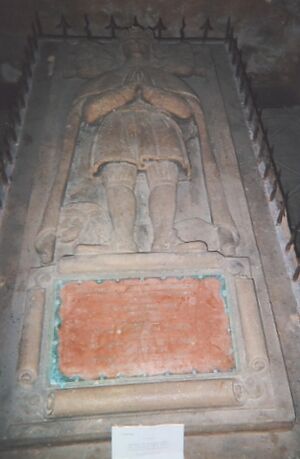William VIII, Duke of Aquitaine facts for kids
Quick facts for kids William VIII |
|
|---|---|
 |
|
| Duke of Gascony | |
| Reign | 1052–1086 |
| Predecessor | Bernard II Tumapaler |
| Successor | William IX, Duke of Aquitaine |
| Duke of Aquitaine | |
| Reign | 1058–1086 |
| Predecessor | William VII, Duke of Aquitaine |
| Successor | William IX, Duke of Aquitaine |
| Born | Gui-Geoffroi c. 1025 Poitiers |
| Died | 25 September 1086 Chizé |
| Spouse | Garsende of Périgord Matoeda Hildegarde of Burgundy |
| Issue | Agnes of Aquitaine, Queen of León and Castile Agnes of Aquitaine, Queen of Aragon and Navarre William IX, Duke of Aquitaine |
| House | Ramnulfids |
| Father | William V, Duke of Aquitaine |
| Mother | Agnes of Burgundy |
William VIII (born around 1025 – died September 25, 1086) was an important ruler in medieval France. His birth name was Guy-Geoffrey. He first became the Duke of Gascony in 1052. Later, in 1058, he also became the Duke of Aquitaine and the Count of Poitiers. He held these titles until his death in 1086. William VIII took over from his brother, William VII of Aquitaine.
Contents
Who was William VIII?
William VIII, originally named Guy-Geoffroy, was the youngest son of William V, Duke of Aquitaine. His mother was Agnes of Burgundy, Duchess of Aquitaine. He was also related to a very powerful ruler, Henry III, Holy Roman Emperor. Henry III was married to William VIII's sister, Agnes de Poitou.
How did William VIII become a Duke?
William VIII first became the Duke of Gascony in 1052. This happened while his older brother, William VII, was still ruling Aquitaine. Gascony became part of the Aquitaine lands because of an earlier marriage. William V, William VIII's father, had married Prisca of Gascony. She was the sister of Duke Sans VI Guilhem of Gascony. This marriage helped connect Gascony to the Aquitaine family.
William VIII's Role in History
William VIII was a key leader in an important military event in 1064. He helped lead an army to support Ramiro I of Aragon during the Siege of Barbastro. This battle was significant because it was one of the first major campaigns supported by the Pope against a Muslim stronghold. It was a bit like an early version of the later Crusades.
The Siege of Barbastro
During the Siege of Barbastro, William VIII and his allies managed to conquer the city. They took many valuable items from the city. However, the city was later lost again by Aragon.
Building Alliances with Southern Kingdoms
William VIII made it a priority to form strong connections with the kingdoms in what is now Spain. He did this by arranging marriages for his daughters. All of his daughters married kings from these Iberian kingdoms. This helped create important political alliances during his rule.
William VIII's Family Life
William VIII was married three times during his life. He had at least five children. His first two marriages ended in divorce. His third marriage was to a younger woman who was also his cousin, Hildegarde of Burgundy. This marriage gave him a son, who would become his heir.
Recognizing His Children
Because his third wife was also his cousin, William VIII had to get special permission for his children to be considered legitimate. He traveled to Rome in the early 1070s to speak with the Pope. He successfully convinced the Pope to recognize his children from his third marriage as legal heirs.
William VIII's Wives and Children
- First wife: Garsende of Périgord. She was the daughter of Count Aldabert II of Périgord. They divorced in November 1058 and had no children. She later became a nun.
- Second wife: Matoeda. They divorced in May 1068.
- Agnes: She married Alfonso VI of Castile, who was a king in Spain.
- Third wife: Hildegarde of Burgundy. She was the daughter of Duke Robert I, Duke of Burgundy.
- Agnes: She died in 1097 and married Peter I of Aragon, another king in Spain.
- William IX, Duke of Aquitaine: He became William VIII's heir and took over his titles.
Images for kids
See also
- Dukes of Aquitaine family tree
|
William VIII, Duke of Aquitaine
House of Poitiers
Born: c. 1025 Died: 25 September 1086 |
||
| Preceded by Bernard II |
Duke of Gascony 1052–1086 |
Succeeded by William IX |
| Preceded by William VII |
Duke of Aquitaine 1058–1086 |
|
| Count of Poitiers 1058–1086 |
||


